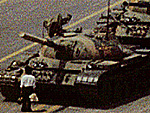
As life slowly returned to normal and people began to concentrate on rebuilding the economy, the shock waves from the Cultural Revolution continued to be felt at the highest levels of the Party and the government. Through its dominance of the "Three-in-One Committees," the PLA was now the de facto government in most of China. Mao, whose view of Party-Army relations was summed up in the slogan, "the Party commands the gun, and the gun must never be allowed to command the Party," had to be on his guard against a possible military power grab.
In August 1970, Lin Biao and Chen Boda proposed that the post of Head of State (which had been abolished when Liu Shaoqi was removed from office) be revived and that the Party formally endorse the "theory of genius," on the grounds that an intellectual giant of Mao's stature happened along only once in several centuries. Mao probably interpreted these proposals as an attempt to shove him "upstairs" to a position where he could rule only through Lin and Chen. He defended himself by reducing Lin's power base by calling on several PLA generals and Lin's wife to make "revolutionary self-criticisms," and removing Chen Boda from office as chief Party theoretician.
Lin had to take action to preserve himself, and matters came to a head in September 1971. It is alleged, but has never been conclusively proven, that Lin, members of his family, and a clique of senior officers drawn mostly from the Air Force planned to assassinate Mao and seize power in a coup d'etat. The attempt did not succeed and Lin fled the country, but his plane crashed and burned in Mongolia. The immediate aftermath of this attempted coup was a purge of several hundred top military and Party officials. The longer-term effect was to undermine the position of the "radical" political elements within the Party associated with Lin and Chen.
Mao's health began to fail after 1972, and he became less active in public life. Premier Zhou Enlai came to occupy the number-two position of power. His economic philosophy of pragmatic modernization and economic incentives was very close to the ideas represented by Liu Shaoqi and Deng Xiaoping, but he had escaped censure during the Cultural Revolution due to his close association with Mao, administrative competency, and carefully neutral stance. As leader of the State Council, he had essentially run the country by himself when most of the central ministers and their subordinates were removed from office by the Red Guards, a feat which won him great respect. From 1972 to 1976, a seesaw power struggle developed between Zhou's more moderate faction and the radical group led by Jiang Qing.
Zhou died in January 1976 and Mao appointed Hua Guofeng, one of Zhou's protégés, as acting Premier. Mao himself died in September 1976, and Hua and the "moderate" elements in the Party arrested Jiang Qing and the radical leaders associated with her (called the "Gang of Four") within a month. After ten years of turmoil, the Rightists had won.
The Aftermath of the Cultural Revolution
Hua proved unable to establish himself firmly as Mao's successor. By 1980, through clever maneuvering and the backing of his supporters in the Party, the administration, and the 'professional" factions in the PLA, Deng Xiao ping had replaced Hua as ruler of China. Many people allied with Deng who had suffered at the hands of the radicals were released from prison to take up political duties once again or were given posthumous rehabilitations.
Deng dismantled the People's Commune agricultural system, created Special Economic Zones that opened China's ports to foreign investment, began to break up the large state-owned industrial concerns, and encouraged the growth of small enterprise. These economic reforms have been called "market socialism" and have created material affluence, but only for some. This, combined with demographics (It has been estimated that by the year 2000, there will be over 30 million young Chinese men for whom there will be neither enough jobs nor wives. In any society, a large group of young unattached males is an ideal source of social disruption.), extreme corruption in the Party itself, and the fact that the level of contact between ordinary Chinese and the outside world has exponentially increased, has created immense social pressures and widespread cynicism towards politics.
The ultimate defeat of the radical factions and the subsequent reforms by the Rightists killed the promise of an egalitarian Socialist society. The Chinese Communist Party is now a party based on privilege and the government has become violently repressive of mass political dissent, as was shown by the Tienanmen Square Massacre in 1989. In the end, it seems that the Cultural Revolution, instigated by the Party's chief radical, achieved nothing but chaos and violence.
The Great Proletarian Cultural Revolution China
Back to Cry Havoc #18 Table of Contents
Back to Cry Havoc List of Issues
Back to MagWeb Master Magazine List
© Copyright 1996 by David W. Tschanz.
This article appears in MagWeb (Magazine Web) on the Internet World Wide Web. Other military history articles and gaming articles are available at http://www.magweb.com